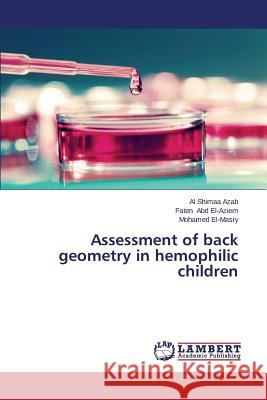Assessment of back geometry in hemophilic children » książka
Assessment of back geometry in hemophilic children
ISBN-13: 9783659648663 / Angielski / Miękka / 2014 / 152 str.
Hemophilia is a group of inherited, congenital life-long blood disease. Children with Hemophilia are vulnerable to a high percentage of musculoskeletal lesions. These lesions predominantly affect lower limbs, influencing postural control. The purpose of this study was to determine the abnormality in back geometry in hemophilic children in comparison with normals. Hundred boys participated in this study. 60 hemophilic children with their mean age 11.183 0.89 years and 40 normal children, their mean age 11.35 1.027 years. The two groups were evaluated using formatric instrumentation system. Data were compared between the two groups using Mann Whitney U test. Children with hemophilia in comparing with normal were found to be significantly differ in parameters regarding to frontal profile except trunk length and dimple distance. While the parameters of sagittal view were non significant except trunk inclination and inflection point. Conclusion: There were back abnormalities in frontal view in form of scoliosis in comparing to normal. These results may be due to muscle weakness, joint changes, alteration of proprioception and pain."
Hemophilia is a group of inherited, congenital life-long blood disease. Children with Hemophilia are vulnerable to a high percentage of musculoskeletal lesions. These lesions predominantly affect lower limbs, influencing postural control. The purpose of this study was to determine the abnormality in back geometry in hemophilic children in comparison with normals. Hundred boys participated in this study. 60 hemophilic children with their mean age 11.183±0.89 years and 40 normal children, their mean age 11.35±1.027 years. The two groups were evaluated using formatric instrumentation system. Data were compared between the two groups using Mann Whitney U test. Children with hemophilia in comparing with normal were found to be significantly differ in parameters regarding to frontal profile except trunk length and dimple distance. While the parameters of sagittal view were non significant except trunk inclination and inflection point. Conclusion: There were back abnormalities in frontal view in form of scoliosis in comparing to normal. These results may be due to muscle weakness, joint changes, alteration of proprioception and pain.











